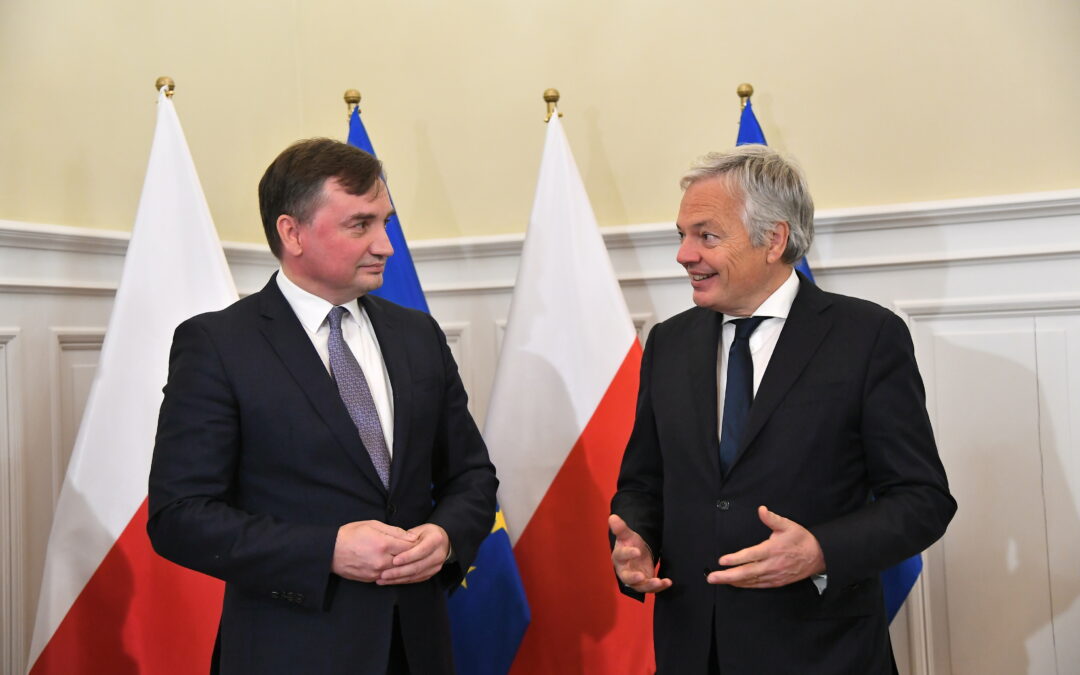The European Union’s commissioner for justice has said that the “only” thing being asked of Poland to defuse rule of law tensions with Brussels was to abide by the latest EU rulings to roll back its judicial reforms.
During his two-day visit to Warsaw, Didier Reynders met with Poland’s justice minister Zbigniew Ziobro, who said that Poland was not being treated “equally” by Brussels, which he said itself went against the rule of law.
Reynders reiterated that Poland’s reforms “increased the influence of the executive and legislative powers over the judicial power to the detriment of the independence of judges”. He said that “threats to the rule of law undermine the EU core. Shortcomings in one country impact other member states and the entire EU”.
“There is no rule of law without equal treatment,” said Ziobro in a joint conference. “Some countries are allowed to introduce changes in the judiciary, and other countries are deprived of such possibilities, just because this is what a commissioner, a CJEU judge or a Berlin politician wants to do.”
He also presented the commissioner with “symbolic” photos showing Warsaw destroyed in 1944 by the German army. “These photos…show that Poles are sensitive to the principle of equal treatment of countries, including in the EU,” he explained after the meeting.
Przekazałem komisarzowi @dreynders zdjęcia obrazujące historię Warszawy i zniszczenia, jakich dokonali Niemcy, realizując ideologię segregacji narodów. Te fotografie mają wyraz symboliczny. Pokazują, że Polacy są i będą wrażliwi na zasadę równego traktowania państw, również w UE. pic.twitter.com/iaCXkNmvzh
— Zbigniew Ziobro | SP (@ZiobroPL) November 18, 2021
The visit comes amid a longstanding feud between the Polish government and the European Union, which has accused Poland of flouting democratic standards by undermining the independence of its judiciary.
In September, Reynders warned that “decisive action” may be taken against Poland. The following month, the top European court imposed a daily fine of €1 million on Poland until it complies with a ruling to suspend its disciplinary chamber for judges, as ordered by the same court earlier this year.
Poland is already being fined €500,000 a day for failing to respect a separate CJEU ruling requiring it to close a coal mine on the border with the Czech Republic. Earlier this week, Ziobro filed a motion with Poland’s Constitutional Tribunal asking whether the CJEU’s fines were lawful.
Poland's prosecutor general has asked the Constitutional Tribunal whether daily fines imposed by the EU's top court for refusing to shut down the country's Turów mine are lawful.
The penalties have come to more than €28 millionhttps://t.co/pKvly7JiIs
— Notes from Poland 🇵🇱 (@notesfrompoland) November 15, 2021
The justice minister, who is also Poland’s prosecutor general, has pushed the government to oppose European demands to roll back its reforms, accusing Brussels of mounting a “hybrid war” on the country and “acting in bad faith”.
In an interview on TVN 24 on Friday, Reynders said that “implementing the recent decision of the European Court of Justice on the end of disciplinary procedures against judges in Poland” was the “only thing that we are asking the Polish government for”.
He then also asked officials to “consider” a “reform” to replace the Disciplinary Chamber with a “truly independent” body “without such a disciplinary regime”.
Asked about the government’s claims that other member states, including Germany, have also questioned the primacy of EU law, Reynders said the EU “reacted in individual situations” and that the Polish case was deeper, due to concerns about the “independence of the justice system”.
He noted that if Poland refused to willingly pay its fines, which were imposed in October, the European Commission would take it upon itself to collect them.
Reynders also met with minister for EU affairs Konrad Szymański, human rights commissioner Marcin Wiacek, and Marian Banaś, who heads Poland’s Supreme Audit Office (NIK).
He also had meetings with the opposition speaker of the Senate, Tomasz Grodzki, as well as committees in the upper house of parliament. “The [Polish] Senate is committed to #RuleOfLaw and I hope we can continue to defend our common [EU] values together,” he wrote on Twitter following the meeting.
On Thursday, the commissioner met committees for justice and EU affairs in the Sejm, the lower house of parliament, to present the European Commission’s rule of law in Poland in 2021 on the state of the judiciary, media, corruption as well as institutional checks and balances.
Coinciding with Reynders’s visit, German interior minister Horst Seehofer also visited Warsaw to meet his counterpart Mariusz Kamiński and express his support for Poland’s actions on its eastern border with Belarus.
“We stand by Poland,” said Seehofer. He added that the country was doing the “right” thing to counteract “this migratory crisis”, and that it was acting “on behalf of the European Union”.
“We have the same reading of the situation on the border,” said Kamiński.
Main image credit: Ministerstwo Sprawiedliwości/Press Materials

Maria Wilczek is deputy editor of Notes from Poland. She is a regular writer for The Times, The Economist and Al Jazeera English, and has also featured in Foreign Policy, Politico Europe, The Spectator and Gazeta Wyborcza.




















